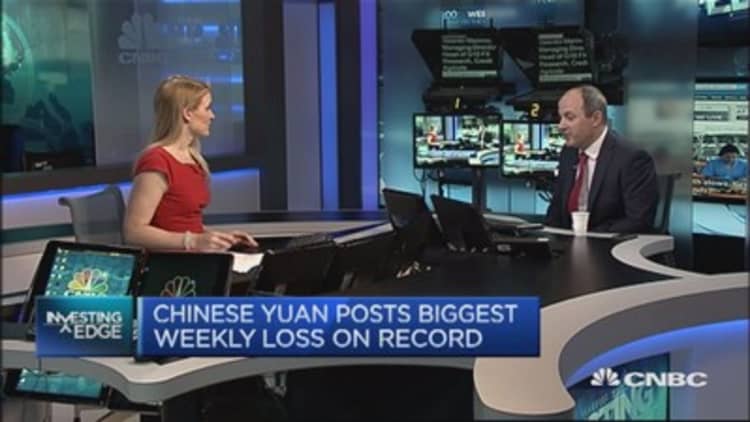The euro and yen climbed to seventh-month highs against the dollar on Monday as investors, worried about the slowdown in China, reversed bets on so-called carry trades and bought back the low-interest rate currencies used to fund those assets.
The dollar index, which measures the greenback's performance against a currency basket, fell to 92.621, its lowest in seven months as investors reduced expectations of an interest rate increase by the Federal Reserve in September. It last stood at 93.41, down 1.68 percent.
The yield on the 10-year U.S. Treasury fell below 2 percent, diminishing the dollar's allure.
Ultra-low interest rates in the euro zone and Japan have prompted investors in recent months to borrow in euros and yen to purchase currencies that provide higher returns, typically commodity currencies such as the Australian and New Zealand dollars.

In times of financial stress, however, investors sell those higher-yielding currencies and flock back to the euro and yen, with both benefiting from an unwinding of those carry trades.
"If the euro can hold above 1.1525 over the next day or so, it would be an extremely bullish signal for the pair," said London-based Craig Erlam, senior market analyst at OANDA.
Read MoreUS dollar bull run hits global dividend payouts
"Ordinarily, a daily close would be a sufficient sign, but this is no ordinary day. I would like to see how traders react to these levels in the absence of market panic."
The thinness of markets in the summer, when many traders take vacations, has also contributed to Monday's sharp moves.
In late trading, the euro jumped to $1.1714, its highest since mid-January. It last stood at $1.1594, up 1.8 percent, with its sustained rise in the past few weeks likely to cause unease within the European Central Bank.
The dollar dropped as low as 116.47 yen, its lowest in seven months, and last changed hands at 118.61, down 2.81 percent.
Read More Is the euro the new safe haven?
Worries about a slowing Chinese economy, and in turn global growth and deflation, engulfed markets after a run of weak data from China in recent weeks, including Friday's survey showing a further deterioration in China's manufacturing activity.
Traders said the weakness in the dollar index reflected doubts whether the Fed will be able to raise interest rates next month. But without clear signals from the U.S. central bank so far, many commodity and emerging market currencies would continue to struggle against the greenback.
That gave credence to a view that while the dollar was likely to struggle against other major currencies, it would rise against those in emerging markets.

